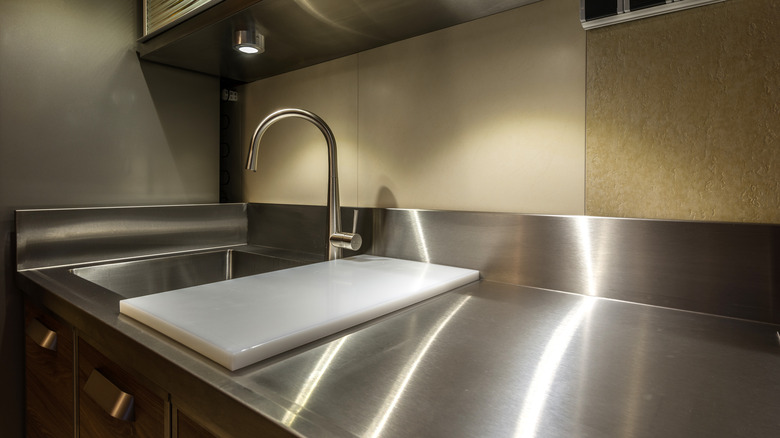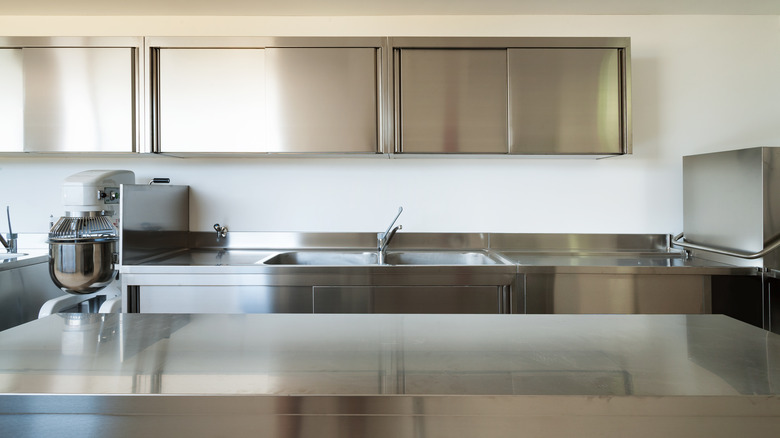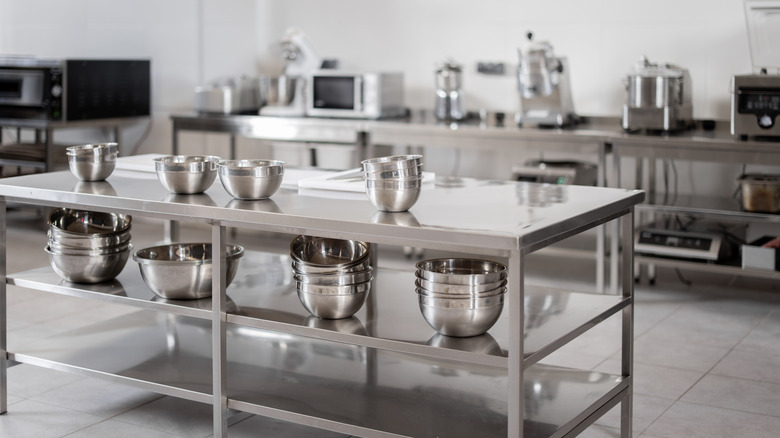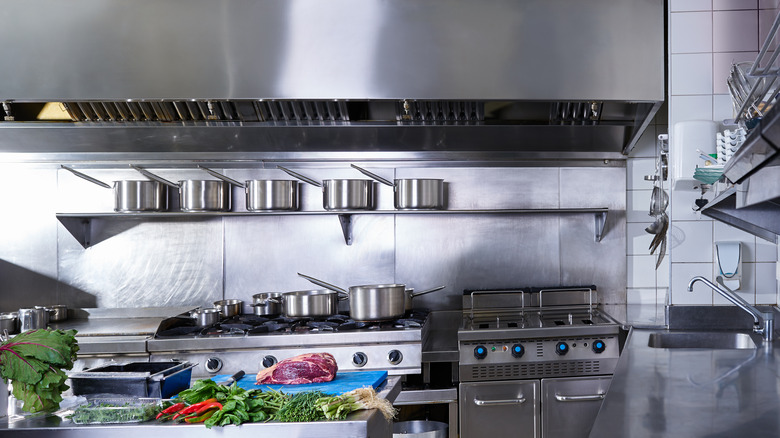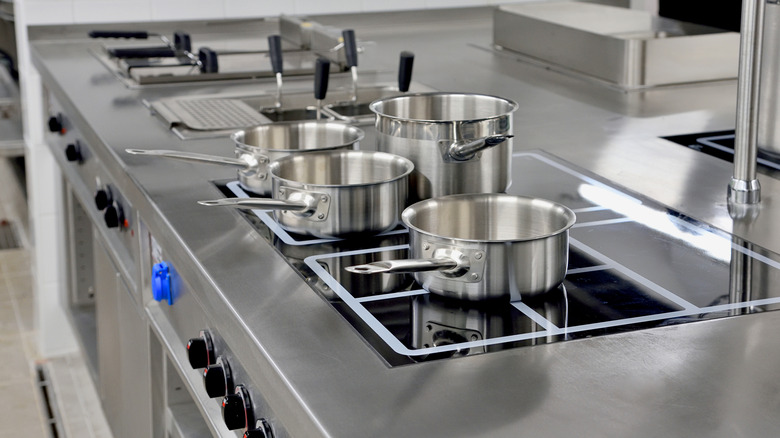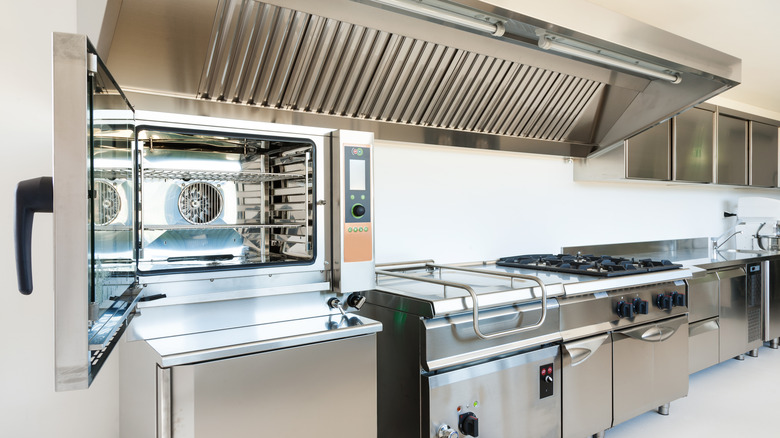The Downsides Of Stainless Steel Countertops
Most commonly found in professional kitchens, like those inside restaurants and upscale hotels, stainless steel offers a distinct contrast to popular countertop materials such as quartz or marble. While not an extremely widespread trend, the feature has grown popular over the years as interior designers have sprung to implement industrial aesthetics into homes (via Countertop Specialty). In terms of application, these counters may make a functional addition to the home of a professional chef or someone who appreciates the qualities of a modern kitchen.
Stainless steel countertops offer their fair share of benefits and are quite helpful within commercial settings. However, the feature might not be all that practical within a typical single-family home, as it can present homeowners with more issues than benefits in the long run. If you're considering implementing stainless steel surfaces in your home, consider some of these potential downsides (and beneficial advantages) to installing these counters inside your kitchen.
Price
It's reasonable to begin our list with one of the most common factors affecting most homeowners' renovation decisions: cost. Stainless steel countertops are expensive. According to HPD Consult, the countertops range from $70 to $200 per square foot, making them far more costly than your average granite or quartz alternatives, which usually range from $40 to $60 per square foot.
Stainless steel countertops are also expensive to install. These counters are always custom-made, so a professional contractor should set them into place to ensure the perfect fit for your kitchen. Home Advisor says the entire installation process can cost anywhere from $4,000 to $11,250, depending on the size of the kitchen and the individualized pay rate of the hired contractor. Home Advisor also states that installing just 50 square feet of stainless steel counters could cost a homeowner around $7,500. So, it's essential to consider whether the advantages of adding stainless steel countertops to your kitchen will be worth the hefty investment.
Malleability
After investing so much money into stainless steel countertops for your home, you'd think they would at least remain in excellent condition years after installation. This isn't always the case, unfortunately. These countertops scratch and dent quite easily, showing marks and imperfections. Owners of stainless steel appliances should also know that fingerprints often appear on the material's surface and are highly noticeable. According to HPD Consult, these countertops behave no differently in response to human touch. While they are relatively easy to clean, having to do so frequently could inconvenience some homeowners.
It's important to note that while malleable, this premium material is also very durable. When developed into countertops, stainless steel can last the average homeowner anywhere from 25 to 35 years, HPD Consult says. In fact, Silver Star Metal Fabricating states that these counters are the prime choice for commercial kitchens because they can withstand the hustle and bustle of a hyperactive culinary staff. Thus, you probably wouldn't have to worry about replacing your stainless steel countertops anytime soon, but that doesn't necessarily mean they'll look brand new for long.
Noisiness
Stainless steel countertops may not be the best addition to your kitchen if you prefer a quiet home. According to Countertop Specialty, the surfaces pick up and amplify every utensil drop, plate clatter, and dish slide in your kitchen at all hours. If you've ever dropped a metal water bottle or thermos on a hard surface, you know it creates a sound you can't quite completely get used to. Stainless steel countertops will have a similar effect in your kitchen!
Sure, solid objects making contact with a hard surface will make noise regardless, but the surface being stainless steel will make the sound much louder and can even produce a ringing effect, creating a nightmare for those with sensitive ears. To solve the problem, Countertop Specialty says to install the counters with padding underneath to help absorb excess sound. This makes the stainless steel less noisy as a whole. As an alternative solution, Countertop Specialty also recommends choosing a lower-gauge sheet metal when designing your counters to help reduce noisiness.
High-maintenance
As mentioned earlier, stainless steel shows fingerprints and smudges more prominently than other materials used for counters. As a result, stainless steel countertops must be cleaned and polished regularly for them to look their best. Affresh recommends cleaning stainless steel products at least once a week to keep them in good condition. However, even putting your all into keeping your counters clean may not be enough to keep them pristine. This is because stainless steel surfaces tend to dull very quickly. While there are some at-home remedies and commercial polishes you can use to restore the shine of your counters, they are likely to dull over time with frequent use and cleanings.
That being said, it's important to avoid using harsh household cleaners that you likely use to clean the rest of your kitchen. For example, stainless steel does not react well to bleach, glass cleaner, tap water, or oven cleaners. Instead, HPD Consult says to use warm, soapy water and a microfiber cloth to achieve the best results when cleaning stainless steel countertops.
Advantages to stainless steel countertops
Although this article highlights the negative qualities of stainless steel countertops, there are plenty of advantages to adding these surfaces to your kitchen. For instance, these counters resist heat and rust, per HPD Consult, due to the fact that the material consists of nickel and chromium. Since the metal doesn't burn, it's safe to place hot pots, plates, and pans atop the counter without fearing the heat will leave permanent markings on the surface. Stainless steel, as you can tell by its name, also resists stains, which can prove very beneficial for homeowners raising small children.
One other major benefit is the material's hygienic surface. This quality can come in handy inside a kitchen, where you're likely to come in contact with a variety of germs and bacteria. According to Countertop Specialty, stainless steel is non-porous, meaning it doesn't absorb and store liquids like other counter materials. It's also challenging for bacteria to linger on it for long periods of time, so the product makes a great addition to a room that must be kept clean in order to avoid illness. Stainless steel counters may also be the best choice for homeowners going for a monochromatic aesthetic in their house. These counters can blend seamlessly with other stainless steel appliances inside your kitchen, creating a theme that is modern, sleek, and pleasing to the eye.
